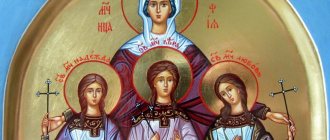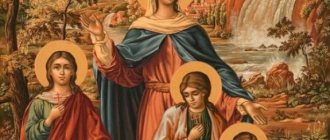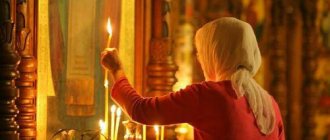Origin of the martyrs
In the second century AD, there lived a pious widow in the city of Rome. Her name was Sophia , which means “God’s wisdom.” She named her three daughters after Christian virtues and raised them in the faith.
In those days, the wicked Emperor Hadrian ruled. He persecuted Christians. When he was informed that a noble widow had raised her daughters in Christianity, he sent messengers to bring them to the palace. The emperor ordered the girls to bow to the pagan goddess Diana. But they refused to do this, confessing their faith in the One God.
Then he ordered one pagan woman to “reason” with the naughty girls. For some time they listened to what the woman told them, but did not take her words to heart. Then the emperor called them to him again. He promised them great riches and honors if they renounce Christ. But the courageous girls refused, wishing to accept death rather than worship the pagan gods .
The emperor was sorry to destroy such young creatures, and he persuaded them to the last. But they were firm in their conviction.
Faith, Hope, Love and their mother Sophia
Peace to you, dear visitors of the Orthodox website “Family and Faith”!
During the reign of Emperor Hadrian, there lived a widow in Rome. Her name was Sophia, which translated means “wisdom.”
The Apostle James wrote that wisdom is pure, modest, full of mercy and good fruits (James 3:17). According to the apostolic words, pious Sophia lived. This is how she raised her daughters: Vera, Nadezhda and Lyubov.
Sofia and her daughters
After the birth of her youngest daughter, Sofia became a widow. Honest, good-natured men, senators, patricians from ancient Roman families, and wealthy military leaders wooed her, but she vowed to remain faithful to her husband and did not remarry. It was not easy for Sophia to raise three daughters alone, but she remembered the words of the Apostle Paul that a true widow trusts in God and remains in prayer day and night (I Tim 5:5). And Sofia believed that the Lord would not abandon her and her children.
Sofia was a Christian - that’s how she raised her daughters. While each of them was a baby, the mother told them about Jesus Christ, about the Mother of God, about the holy saints, about the Church Sacraments. When the girls grew up, she taught them to read and write and they themselves read the Gospel and the apostolic books.
Rumors of a strange family living a reclusive life spread throughout Rome, arousing curiosity. Most Romans spent the entire day outside: in the forum, in the circus, in gardens, baths, and at city festivals. They only spent the night at home. But Sofia and her daughters, rumored to be beautiful and attractive, almost never left the house. Curiosity gave rise to suspicion. Why don't they live like everyone else? And the mother and daughters read and prayed to the Lord at home.
Confession of Christ
The ruler of the part of Rome where Sophia lived with her children, praetor Antiochus, wished to meet the unusual family. Antiochus hated Christians and boasted that he had an instinct for them. He can smell a Christian a mile away, like a good dog can smell a hare.
Antiochus knew that Sophia was rich - after all, her late husband left her a decent inheritance. But in front of them stood a woman with her daughters in very simple clothes, which did not correspond to their position as a rich widow. This means that she deliberately dressed herself so poorly and dressed her children no better. Rich people prefer clothes made of silk, but here the cheapest linen fabric is!
Antiochus suspected that Sophia and her children professed Christianity.
In the ruler's chambers there was a bronze statue of Emperor Hadrian with a small altar in front of it. Antiochus invited Sophia to pour wine and burn incense in front of the statue of the emperor.
Sofia refused, saying that she was a Christian and did not worship idols.
Antiochus had no right to punish Sophia, because she was a Roman citizen, but he immediately let Emperor Hadrian know about what had happened. An order immediately followed to bring Sophia and the children to the imperial palace.
Let nothing tear us away from You, our God.
When Sophia and her daughters returned home from Antiochus, a centurion with a detachment of praetorians was waiting for them at the door of her house. Silently, he handed Sofia two wax tablets fastened with silver rings. Sofia asked the centurion for a few minutes of privacy with her daughters in her home. She hugged her children and said that it was time to show that we are Christians. And before that, the four of them knelt down and turned to God with prayer:
- All-merciful God, do not leave us, send us Your holy help, so that we will not be afraid of terrible torment. Let nothing tear us away from You, our God.
The centurion knocked on the door with the hilt of his sword. Time to go.
In the emperor's palace
Interrogation awaited them in the palace of Emperor Andrian. The Emperor was once again convinced that Sophia and her daughters believed in the Lord Jesus Christ, the Son of God. Out of respect for Sophia's late husband, a famous Roman tribune, the emperor gave them two days to think it over.
The holy saint and her daughters were placed in the house of the noble Roman woman Palladia. The house was spacious, with a swimming pool in the middle and a garden adjacent to it. But the holy saints did not even look at the goldfish frolicking in the pool, and never went out into the garden. Having placed a cross made of cypress branches on the table in the room allotted to them, they prayed to the Lord.
Sophia strengthened her daughters with words about the temporary nature of torment, that they are transitory, but the Kingdom of God is endless, and the mercy of the Lord and His love are limitless. Pray to the Lord, and He will not leave you in trials. On the third day, Sophia and her daughters were again brought to the emperor.
Martyrs for Christ
Realizing that Sophia stands firmly on the rock of her faith. Andrian decided to seduce the girls. And he began the interrogation with them, because they were probably easier to break. Sofia was taken to the columns that framed the hall.
At first, Adrian tried to persuade the eldest twelve-year-old Vera to renounce Christ. In response to the refusal, terrible torture followed. She was laid on white-hot iron bars, but the innocent girl lay on them as if on a bed woven from tree branches. She was dipped into boiling oil, but she sat in the cauldron as if it were filled with cool water.
The Emperor could not believe his eyes. In anger, he ordered the girl's head to be cut off.
Nadezhda and Lyubov shuddered when they saw their dead sister, the friend of their games, fun and prayers, and looked at their mother. Sofia, raising her eyes to heaven, prayed, but two large tears flowed down her cheeks.
Raising Vera's head by the braids, the executioner showed it to the emperor. And then, by order of the emperor, the executioner brought Vera’s head right to her mother’s face. Sofia gently took her sweet face in her hands and kissed her blood-caked lips.
Now the emperor turned to ten-year-old Nadezhda. But she, in whom the same prayers lived as in the heart of her martyr sister Vera, did not renounce the True God.
And again the whips whistled, the fire burned again, the innocent child’s body was torn by iron hooks, and the boiling oil gurgled in the cauldron again.
Who would not think about what he saw, who would not believe in Christ at the sight of such obvious miracles! And after all, children could not be accused of magic, as Christians were usually accused, who steadfastly endured unbearable torment. Sophia's daughters were too young to master the techniques of magic. But the emperor’s heart was so darkened by malice towards the Lord that, according to the Gospel, he looked and did not see. And again it sounded: Cut off her head. Nadezhda, lifeless, fell next to her older sister Vera.
It was the turn of the younger Lyubov. And Adrian first tried to seduce her with caresses, because she was just a child. With her he hoped to achieve success. But neither his flattery nor his caresses touched Lyubov’s soul. She was a child, but the death of her older sisters before her eyes made her soul an adult. Words that had not recently been in her head were born on their own in a child’s heart when she boldly and firmly answered the emperor. Sofia's last daughter was executed.
Heirs of Eternal Joy
Adrian thought that now Sophia would weaken and renounce Christ. What kind of mother would resist seeing the death of her three daughters, whom she gave birth to, fed, raised, over whose cradles she spent so many sleepless nights, whose success in reading and writing and memorizing prayers she rejoiced, with whom she secretly went to an underground Christian church and there received communion of the Saints of Christ Tine? What woman's heart could resist and not tremble?
But the look of the mother of the three martyrs was calm, bright and unshakable.
The Emperor did not execute Sophia. He ordered that the bodies of his daughters be given to her so that, looking at them, she would continue to suffer. But Sofia knew that the torment that her little blood had to endure made them heirs of eternal joy in heaven.
The mother, having received the bodies of her daughters, put them in a coffin made one for three, and buried her daughters on a high hill outside the city. For three days she did not leave the grave, crying and praying to the Lord. And three days later the Lord called the mother of the three holy daughters to Himself.
So the wise Sophia ended her life wisely, bringing as a gift to the Holy Trinity her three virtuous daughters - Faith, Hope and Love.
Akathist to the saints mcc. Vera, Nadezhda, Lyubov and Sofia
Torment of girls
At that time, the eldest Vera was only twelve years old, Nadezhda was two years younger than her sister. And the youngest Lyubov was very small, she was nine years old.
But, despite such a young age, the sisters turned out to be wiser and braver than some adults. They knew what awaited them if they confessed their faith, but they stood firm in their position.
The angry emperor decided to start torturing his elder sister. The other girls and mother stood right there and watched her suffering. He hoped that under the impression they would become frightened and renounce their faith. But he was wrong.
Faith
They began to beat Vera mercilessly with metal bars, so that her flesh fell in pieces to the ground. Then they put her on a hot grate and burned her wounds. Then they threw it into a boiling cauldron. All this torment could not force the young Christian to renounce her faith. Then they cut off her breasts, milk gushed out of them instead of blood.
Seeing that the torment did not bring the desired result, the emperor ordered her head to be cut off. Faith said she would gladly die for her Savior. The mother, seeing her daughter’s torment, not only did not lose heart, she was happy for her and persuaded the other daughters to imitate her and gain strength in spirit. “Just a little and you will find yourself close to Our Lord .
Hope
After killing Vera, the tormentor called for his middle sister. Nadezhda boldly and joyfully entered the threshold of torment. Just like her sister, she refused to sacrifice to idols, and they began to torture her. She was also beaten with sticks and thrown into a burning cauldron, but she did not utter a word. Then she too was beheaded.
Love
It's little Lyubov's turn. Her mother, as best she could, strengthened her with words, persuading her to look at the bodies of the tortured sisters, that they were already enjoying in heaven. The cruel torturer subjected the girl to even greater torture. Her body was tied to a wheel and beaten with sticks. The ground quickly turned red with blood. But the little martyr was silent. Then they threw her into a burning oven, but the fire did not harm her, and the flames, bursting out, scorched her tormentors. After this, the girl's head was cut off.
Notes
- O. V. L., Gerasimenko N. V.
Faith, Hope, Love and Sophia // Orthodox Encyclopedia. - M., 2004. - T. VII: “Warsaw Diocese - Tolerance.” — P. 702-704. — 752 p. — 39,000 copies. — ISBN 5-89572-010-2. - The names correspond to Christian virtues from Paul's 1st letter to the Corinthians (13:13)
- Snow as a symbol of chastity
- BBKL Register | Germany | Verlag Traugott Bautz GmbH (German). Verlag T. Bautz GmbH. Date accessed: December 12, 2022.
- L'abbatiale Saint Trophime l'ancienne abbaye Sainte Sophie | Commune d'Eschau (French). Date accessed: December 12, 2022.
Literature
- O. V. L., Gerasimenko N. V.
Faith, Hope, Love and Sophia // Orthodox Encyclopedia. - M., 2004. - T. VII: “Warsaw Diocese - Tolerance.” — P. 702-704. — 752 p. — 39,000 copies. — ISBN 5-89572-010-2. - The suffering of the holy martyrs Faith, Nadezhda and Lyubov, and their mother Sophia // Lives of the saints in Russian, set out according to the guidance of the Chetyih-Menya of St. Demetrius of Rostov: 12 books, 2 books. add. - M.: Moscow. Synod. typ., 1903-1916. — Vol. I: September, Day 17. — P. 325.





